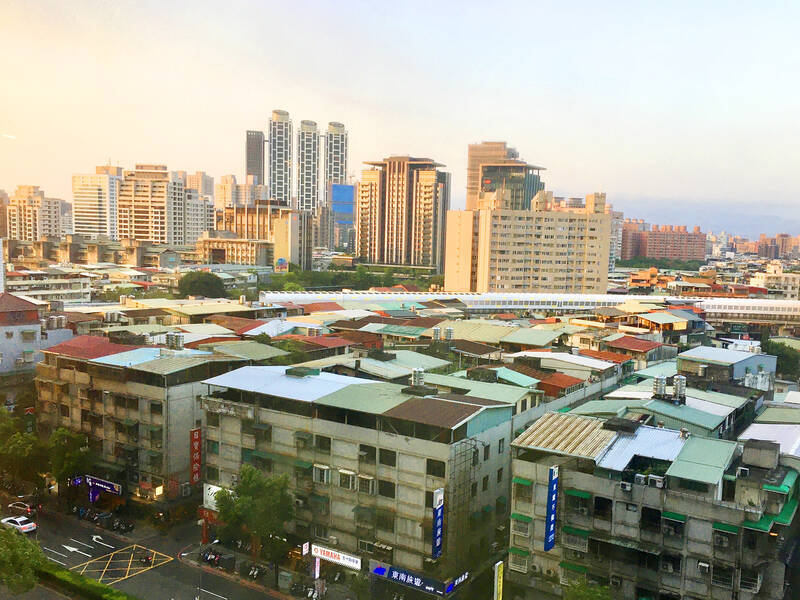Taipei Mayor Chiang Wan-an (蔣萬安) announced that Taipei would enter a “major urban renewal era” as he visited damaged buildings at the weekend.
Dozens of residents living in Zhongzheng District’s (中正) dilapidated Nanjichang (南機場) housing complex were ordered to evacuate their homes as signs of serious damage to part of the buildings’ structure were discovered after an earthquake shook the whole nation on Wednesday last week.
The housing complex was built in three phases in the early 1960s for the resettlement of thousands of residents who were forced to move due to the construction of an embankment or because they were living in illegal buildings in the area, but the living environment has deteriorated due to poor management over the years and the Taipei City Government listed it as a key urban renewal area in 2000.

Photo: Hsu Yi-ping, Taipei Times
After visiting the housing complex on Saturday, Chiang said that many columns of the building were seriously damaged on Wednesday last week, so the city government worked with civil engineers, structural engineers and geotechnical engineers and installed four H-beams to reinforce it.
Although there are still cracks in the walls and concrete scaling, the engineers on Saturday reassessed the building and deemed there to be no immediate danger of collapse, so the evacuated residents could return to their homes, he said.
“I also announced on site that Taiwan will enter a ‘major urban renewal era,’” Chiang said.
The average age of buildings in Taiwan is nearly 40 years, and 72 percent are aged 30 years or older, he said, adding that earthquakes come with no warning, so the city government would vigorously promote urban renewal.
Chiang said the city government previously launched eight measures in an effort to speed up urban renewal projects, and that it would push for more comprehensive urban renewal policies to prevent disasters.
The mayor’s announcement led to many people leaving supportive comments on his Facebook page, but some also mentioned problems and suggestions, including that the building bulk reward for urban renewal must be increased and that government intervention is needed to solve the problem of a few property owners who refuse to move.
Urban renewal should start in areas with a risk of soil liquefaction and the review process must be accelerated, they said.
Asked to comment on the Taipei mayor’s “major urban renewal era” announcement, Premier Chen Chien-jen (陳建仁) yesterday said that the Cabinet would continue to work with local governments and the civic sector to reconstruct dangerous old buildings so that people would be safe in their homes.
The urban renewal of old and unsafe buildings is especially important as earthquakes occur frequently in Taiwan, Chen said, adding that three laws regarding urban renewal were passed between 2017 and 2019, and more than 4,000 projects were approved after the laws had been enacted.

A car bomb killed a senior Russian general in southern Moscow yesterday morning, the latest high-profile army figure to be blown up in a blast that came just hours after Russian and Ukrainian delegates held separate talks in Miami on a plan to end the war. Kyiv has not commented on the incident, but Russian investigators said they were probing whether the blast was “linked” to “Ukrainian special forces.” The attack was similar to other assassinations of generals and pro-war figures that have either been claimed, or are widely believed to have been orchestrated, by Ukraine. Russian Lieutenant General Fanil Sarvarov, 56, head

SAFETY FIRST: Double the number of police were deployed at the Taipei Marathon, while other cities released plans to bolster public event safety Authorities across Taiwan have stepped up security measures ahead of Christmas and New Year events, following a knife and smoke bomb attack in Taipei on Friday that left four people dead and 11 injured. In a bid to prevent potential copycat incidents, police deployments have been expanded for large gatherings, transport hubs, and other crowded public spaces, according to official statements from police and city authorities. Taipei Mayor Chiang Wan-an (蔣萬安) said the city has “comprehensively raised security readiness” in crowded areas, increased police deployments with armed officers, and intensified patrols during weekends and nighttime hours. For large-scale events, security checkpoints and explosives

PUBLIC SAFETY: The premier said that security would be tightened in transport hubs, while President Lai commended the public for their bravery The government is to deploy more police, including rapid response units, in crowded public areas to ensure a swift response to any threats, President William Lai (賴清德) said yesterday after a knife attack killed three people and injured 11 in Taipei the previous day. Lai made the remarks following a briefing by the National Police Agency on the progress of the investigation, saying that the attack underscored the importance of cooperation in public security between the central and local governments. The attack unfolded in the early evening on Friday around Taipei Main Station’s M7 exit and later near the Taipei MRT’s Zhongshan

REBUFFED: In response to Chinese criticism over recent arms sales, Washington urged Beijing to engage in meaningful dialogue instead of threats and intimidation Washington’s long-term commitment to Taiwan would not change, the US Department of State said yesterday, urging Beijing to stop pressuring Taiwan and engage in meaningful bilateral dialogues. The remarks came in response to a backlash from Beijing about Washington’s latest approval of arms sales to Taiwan. The US Defense Security Cooperation Agency said in a statement on Wednesday that the Taipei Economic and Cultural Representative Office in the US has asked to purchase an arms package, including Tactical Mission Network Software; AH-1W helicopter spare and repair parts; M109A7 self-propelled howitzers; HIMARS long range precision strike systems; tube-launched, optically tracked, wire-guided missiles; Javelin